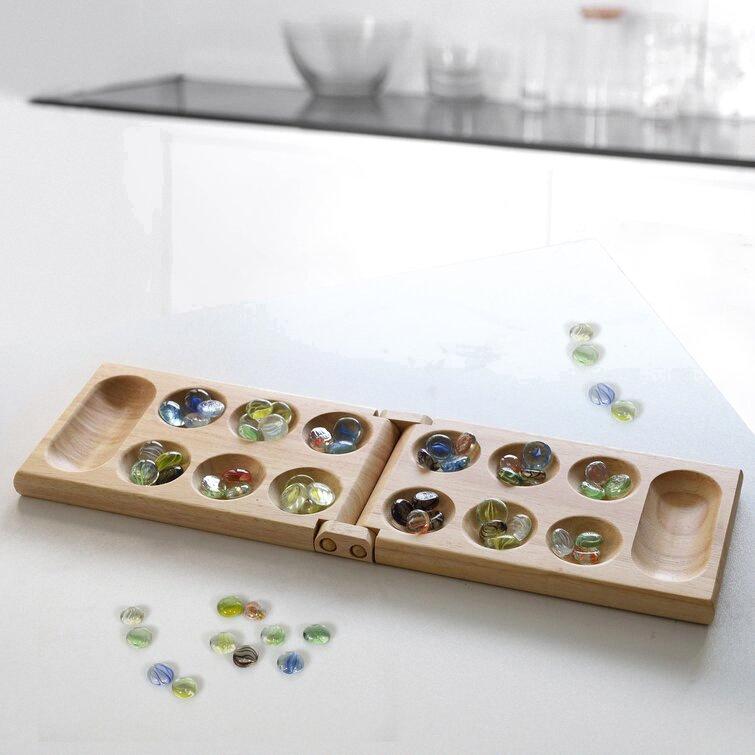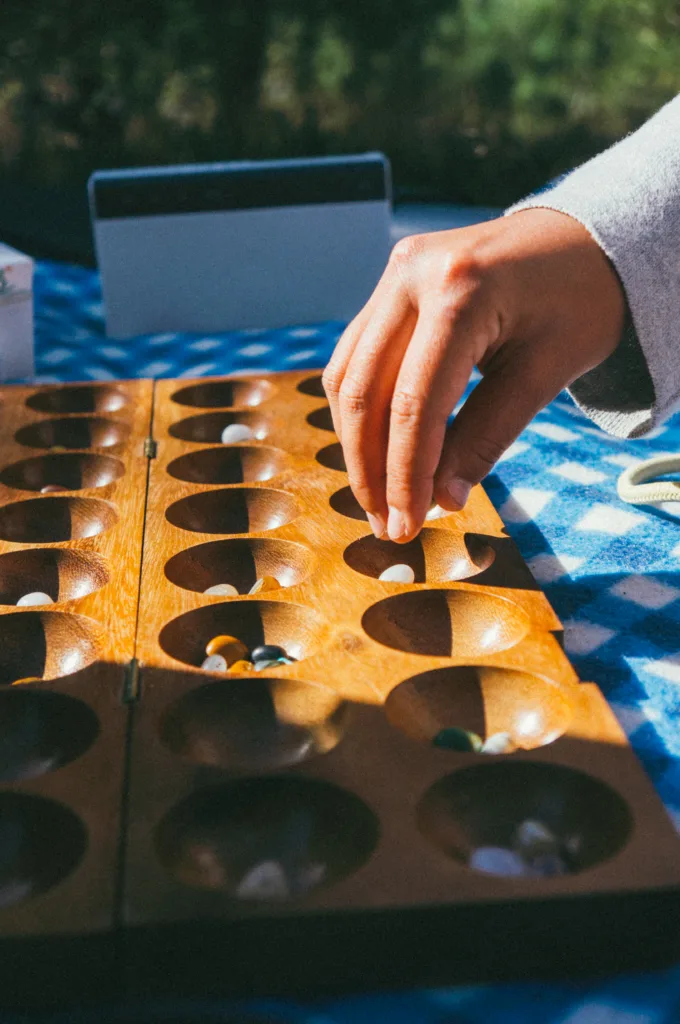Mancala is a traditional African board game that has been enjoyed by people for centuries. The game is simple, yet challenging, and involves capturing seeds from one’s opponent to win. In this article, we will explore the rules of Mancala and how to capture in the game.
To begin, Mancala is played on a board with two rows of six holes each, and a larger hole at each end called a Mancala. The game starts with four seeds in each of the 12 holes. The goal of the game is to capture as many seeds as possible and place them in your Mancala.
Players take turns moving the seeds from one hole to the next, eithr clockwise or counterclockwise around the board. If the last seed you place lands in your Mancala, you get to take another turn. If it lands in an empty hole on your side of the board, you get to take that seed and any seeds in the opposite hole on your opponent’s side of the board.
Capturing seeds is the key to winning in Mancala. In order to capture, the last seed you place must land in an empty hole on your side of the board and the opposite hole on your opponent’s side of the board must be occupied. When this happens, you capture the seeds in the opposite hole and often also the seed in your own hole that effected the capture.
It’s important to plan your moves carefully in order to set up captures and avoid being captured yourself. One strategy is to focus on one side of the board and try to clear it out, making it easier to capture seeds on that side.
If you are going first, starting with your third hole is generally considered to be the best opening move. This will land your last piece in your Mancala zone, not only scoring you a point but immediately giving you a second move before your turn is over.
Mancala is a fun and challenging game that involves capturing seeds from your opponent to win. By understanding the rules of the game and developing a strategic approach, you can become a master of Mancala and enjoy hours of entertainment with your friends and family.
Capturing Seeds in Mancala
Mancala is a popular board game that has been played for centuries in varous regions of the world. The objective of the game is to capture as many seeds as possible and store them in designated holes on the board. In order to capture seeds in Mancala, players must follow a set of rules that are specific to the game.
When playing Mancala, seeds are captured when the last seed of a lap falls into an empty hole on the player’s own side of the board and the opposite hole of his opponent is occupied. This is known as a capture move. The seeds in the opposite hole and often also the seed in the player’s own hole, which effected the capture, are then taken and placed in the player’s store.
It is important to note that capture moves can only be made on the player’s turn. The player must also be strategic in their moves in order to set up potential capture opportunities. This can be done by sowing seeds in a way that forces the opponent to create an empty hole that can be captured in a subsequent move.
In two-row games, there are additional rules for capturing seeds. If the last seed of a lap falls into an empty hole on the player’s own side of the board and the opposite hole of the opponent is occupied, the player captures the seeds in the opposite hole and also the seed in their own hole that is adjacent to the captured hole.
Capturing seeds in Mancala requires strategic planning and adherence to specific rules that vary depending on the type of game being played. By understanding these rules and practicing different strategies, players can improve their gameplay and increase their chances of winning.

Source: wayfair.com
Can You Capture Your Own Stones in Mancala?
You cannot capture your own stones in Mancala. The objective of the game is to capture as many of your opponent’s stones as possible, not your own.
During each turn, a player selects a pocket on their side of the board, takes all the stones from that pocket, and distributes them in a counter-clockwise direction into the oher pockets. If the last stone lands in the player’s own Mancala, they get an extra turn.
However, if the last stone a player drops lands in an empty pocket on their own side of the board, they do not get to capture any stones. This rule ensures that players cannot cheat by intentionally creating empty pockets on their side of the board to capture their own stones.
It should be noted that Mancala is a game of strategy and skill, and while capturing stones is a key part of the game, it is not the only objective. Players must also focus on creating advantageous board positions, blocking their opponent’s moves, and anticipating their opponent’s next moves.
Playing Capture Mode on Mancala on iPhone
Mancala is a game that has been played for centuries and has evolved into different variations. One of the most popular versions is the Capture Mode, which is available for play on the GamePigeon app on iPhone.
To play Capture Mode on Mancala, follow thse steps:
1. Open the GamePigeon app on your iPhone.
2. Tap on the Mancala icon to open the game.
3. Start the game by choosing a pit on your side of the board and picking up all the stones inside it.
4. Move clockwise around the board, dropping one stone in each pit until you have no more stones left.
5. If the last stone you drop lands in your own Mancala pit, you get another turn.
6. If the last stone you drop lands in an empty pit on your side of the board, you capture all the stones in the pit directly opposite on your opponent’s side and place them in your Mancala pit.
7. The game ends when one player has no more stones on their side of the board. The player with the most stones in their Mancala pit wins.
It’s important to note that while the rules of Mancala are relatively simple, the strategies involved in winning can be complex. It’s helpful to plan ahead and try to anticipate your opponent’s moves. Additionally, it’s important to pay attention to the number of stones in each pit and on each side of the board to make the most of your moves.
Capture Mode on Mancala is a fun and challenging game that can be enjoyed by players of all ages.
Making the First Move in Mancala
Mancala is a strategic board game that has been played for centuries. The game involves capturing as many stones or seeds as possible from the opponent’s side of the board while trying to avoid losing your own. The game is played on a board with two rows of six holes, and each player has a mancala zone at the end of the board.
If you are going first in Mancala, starting with your third hole is generally considered to be the best opening move. This move is effective because it lands your last piece in your mancala zone, scoring you a point and immediately giving you a second move before your turn is over. This can give you a significant advantage in the game, allowing you to capture more pieces and control the board.
Starting with the third hole also helps to spread out your pieces and prevent them from being captured by your opponent. By starting in the third hole, you are less likely to create a cluster of pieces that can be easily captured by your opponent.
It is important to note that the best first move in Mancala can vary depending on the player’s strategy and the board setup. However, starting with the third hole is generally a safe and effective opening move that can give you an advantage in the game.
The third hole is considered to be a good first move in Mancala because it scores a point and givs you an extra turn, while also spreading out your pieces and preventing them from being captured by your opponent.

Conclusion
After learning about Mancala, it is clear that this ancient board game has stood the test of time for good reason. With simple rules and endless strategic possibilities, Mancala is a game that can be enjoyed by people of all ages and skill levels. Whether you are looking to pass the time with a friend or sharpen your critical thinking skills, this game is a great choice. Remember to start with your third hole when going first, and keep an eye out for opportunities to capture your opponent’s seeds. With a lttle practice, you may even become a Mancala master. So gather your friends and family, and let the fun begin!
